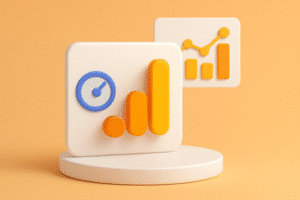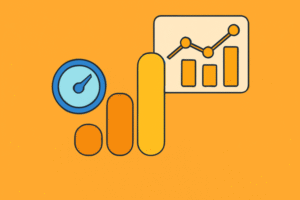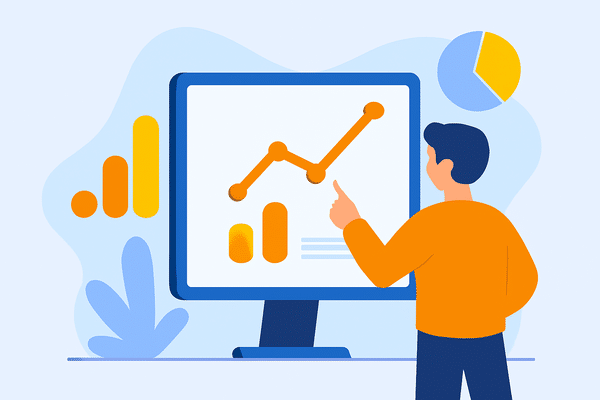Google Analytics
In the age of modern technology and digital marketing, understanding user behavior online and analyzing website performance has become essential for both large and small businesses. One of the most powerful tools in this field is Google Analytics.
This free tool from Google provides website owners and digital marketers with accurate insights and analyses regarding how visitors interact with websites.
In this article, we’ll explore what Google Analytics is, its features, its importance in data analysis, and how companies can use it to improve their digital marketing strategies.

What is Google Analytics?
Google Analytics is a free service provided by Google that offers advanced tools for analyzing web data. It allows website owners to monitor and analyze visitor behavior on their websites. By collecting data on traffic, the most visited pages, and how users interact with content, users can make informed decisions to enhance user experience and boost overall website performance.
Google Analytics is an essential tool for digital marketers and business owners looking to improve their digital strategies. It stands out for its ability to track several metrics, such as traffic sources, user behavior, device performance, and website conversions.
Features of Google Analytics
1. Comprehensive Visitor Tracking
Google Analytics allows users to fully track visitor behavior on a website — from the pages they visit to the amount of time they spend on each page.
It also identifies where visitors are coming from, whether through search engines, social networks, or direct links.
2. Detailed Reports
The tool provides detailed reports on website traffic, including:
- Number of sessions
- Most visited pages
- Bounce rate
- Number of conversions
These reports offer clear insight into website performance and the success of marketing campaigns.
3. Traffic Sources
Google Analytics shows where your visitors are coming from. You can learn whether they came through search engines (like Google), paid ads, social media platforms, or direct links.
This feature helps in evaluating the effectiveness of each marketing channel.
4. User Behavior Analysis
Google Analytics offers tools for analyzing how users behave on your website. For example, you can identify the pages that interest visitors the most and the pages they visit before leaving the site.
This helps in improving user experience and increasing engagement with your content.
5. Device Performance Analysis
With the increasing use of mobile devices, Google Analytics enables you to assess how your website performs on mobile phones and tablets compared to desktop devices. You can then adjust your site’s design accordingly to ensure a smooth user experience across all devices.
6. Conversions
Google Analytics lets you track conversions on your site. You can set specific goals such as completing a purchase, submitting a contact form, or subscribing to a newsletter. The tool allows you to monitor how well these goals are achieved and evaluate the effectiveness of your marketing campaigns.
7. Custom Reports
Users can create custom reports based on their specific needs. These reports help in examining data in a more specialized way, offering accurate insights tailored to business requirements.
8. Integration with Other Google Tools
Google Analytics can be integrated with many other Google tools like Google Ads and Google Search Console. This integration allows for more comprehensive insights and in-depth analysis of advertising campaigns and search engine optimization.
The Importance of Google Analytics in Enhancing Digital Performance
Monitoring Overall Website Performance
Google Analytics is one of the best tools for monitoring a website’s overall performance. It helps identify which pages are performing well and which may need improvement. Based on this data, content and design strategies can be refined.
Improving User Experience
With the data provided by Google Analytics about visitor behavior, website owners can enhance the user experience. Navigation can be improved, loading speed optimized, and content better aligned with visitor interests, increasing time spent on the site.
Evaluating Marketing Campaign Effectiveness
Google Analytics enables you to track various marketing campaigns and measure the effectiveness of each one. Whether the campaigns involve paid ads, email marketing, or social media, the tool provides detailed analysis on whether the campaign is achieving its goals.
Making Informed Decisions
Businesses can use the data extracted from Google Analytics to make informed, data-driven decisions. This includes identifying keywords that drive more traffic, optimizing high-converting pages, or increasing visitor engagement — all of which support business growth.
Continuous Performance Monitoring
Website owners can monitor their site’s performance in real-time using Google Analytics. This allows for immediate identification of issues and prompt action to fix them, reducing any negative impact on user experience or sales.

In conclusion, Google Analytics is an essential tool in the world of digital marketing and online performance optimization. It provides accurate data and insights that help businesses monitor their website’s performance, enhance user experience, and make strategic, data-driven decisions.
By using Google Analytics effectively, marketers and website owners can refine their digital strategies, increase visitor engagement, achieve better results in search engines, and ultimately boost return on investment (ROI).



موضوع احترافي بامتياز! تحسين تجربة الصفحة هو المستقبل، وموقعك هيكون جاهز يتصدّر لما تهتم بالنقاط دي